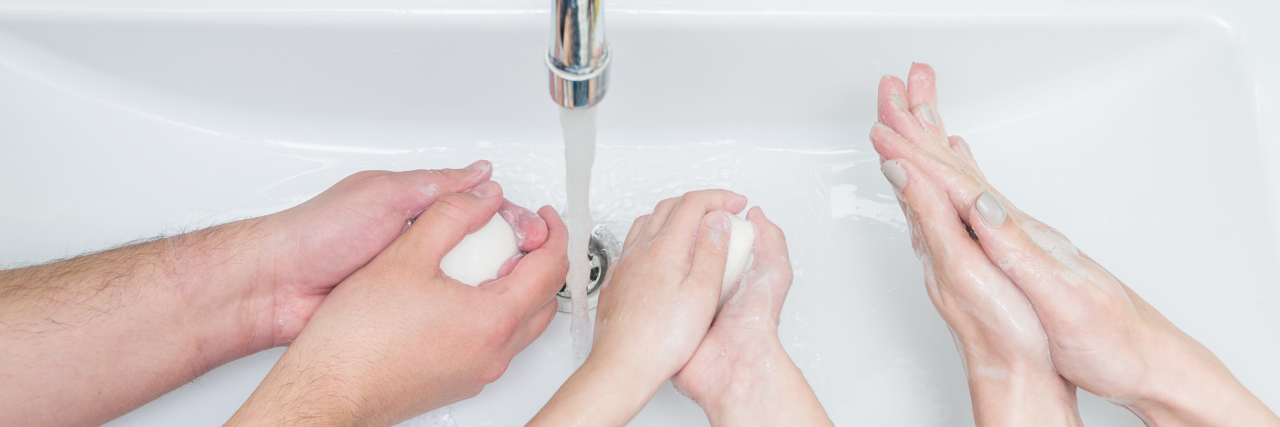Lessons From Families of Kids With Rare Diseases on Surviving a Pandemic
On a normal day, I struggle with anxiety and depression. Now add a global pandemic with two sons who have a weakened respiratory system, and my anxiety gets turned up to 11 (any Spinal Tap fans out there?). Then a week or so ago (who knows when, time has no meaning anymore), I listened to a webinar put on by the National Organization for Rare Disorders (NORD) that helped me relax a little. One of the experts on the webinar reminded me that families of kids with rare diseases already have the tools to survive this pandemic.
The more I reflected on this comment, I realized he was right. Hell, yeah! We got this! While our family hasn’t had to do all of these things, we know people in the rare disease and medically fragile community who have. Let me share their wisdom.
- When people were buying all the toilet paper and hand sanitizer, we didn’t run to the store. We already had a stockpile of hand sanitizer, disinfectant wipes, gloves and masks. In our normal life, we are always on the lookout for infection and ways to prevent it. We are the weird people who wipe the booth down when we go out to eat. Our children have hand sanitizer in their lunchboxes. We are always asking people to wash their hands. It’s just a way of life for us.
- We’ve already been given a shocking diagnosis and had our world turned upside down. With a chronic disease, you never know what is around the corner so we prepare for the worst. The other shoe could drop at any time.
- We have experienced long illnesses or long recoveries from surgery that require us to be in the hospital or to stay home for extended periods of time. We have had to make major adjustments to our lives for long periods of time.
- The minute our providers had telemedicine up and running, we were on it. Before COVID-19, we were using it to avoid germy doctors’ offices already.
- We have coping skills in place to deal with major crises, and we have a therapist on speed dial. Dealing with a chronic disease takes a toll on one’s mental health even if you don’t already have a diagnosed mental illness.
- We’ve probably already quarantined at least once before, and we definitely avoid crowds all the time. Some children can’t go to school during the flu season every single year. Some families choose homeschooling to avoid illnesses that most people don’t think twice about. Some parents take jobs so they can work from home to take care of their child who can’t go to school.
- We know how to give things up and adjust to new realities. We’ve given up careers, jobs, vacations, birthday parties, family gatherings — you name it, we’ve had to give it up and grieve the loss.
- We know how to navigate the health system. True, the health system right now is operating differently than usual. But we are experts at working with nurses, doctors, insurance companies, pharmacies and know how to fight for what we need. We know the questions to ask and where to look for answers.
- We are used to barring people from our homes. One mom in our community has had a sign on her front door for years that asks visitors to make it known if they are sick before entering the house. A sign like that doesn’t seem so weird anymore, does it?
- We already have a sick plan in place. If our boys get a cold or the flu, we mobilize. Inhalers come out of the cabinet, the Cough Assist gets fired up, the BiPap gets used more than just at night, and we have at least three specialists plus a pediatrician we can call for advice. For COVID-19, we can rely on Cure CMD and their cadre of experts from around the world if one of the boys should catch it.
- We understand how research works and why it takes so long to find a solution. We play the long game and have learned patience in the process.
- We are familiar with a world that doesn’t understand what our daily life is like and does not adjust to our needs. Some people just don’t know. Some are willfully ignorant. Many people are willing to put their needs above ours every time. If you think I’m making that up, you need to learn about ableism.
- We already have a support network in place. We can’t navigate this rare disease world by ourselves. We tried and it didn’t work. We have formed a village around us and can rely on them in a tough spot. While on a walk with our dog recently, I ran into a friend also walking her dog. From across the street, I casually mentioned that we were having a hard time getting distilled water for the boys’ BiPaps because the grocery stores were only allowing us to purchase one gallon at a time. A few days later, two gallons of distilled water were on our doorstep. Our team is already assembled.
I’m sure the rare community could add more to this list but I think it’s already a pretty impressive list. For another perspective, I recommend this mom’s blog post “All alone. . . and finally included!” Writing this list hasn’t cured all my anxiety, but it’s a good start and it helps me remember the power I already have within me. I’ve been at this long enough to know I’m going to have my good days and my bad days. I’ll get through it as I always do. I mean, do I really have a choice?
Getty image by Evgen_Prozhyrko.

